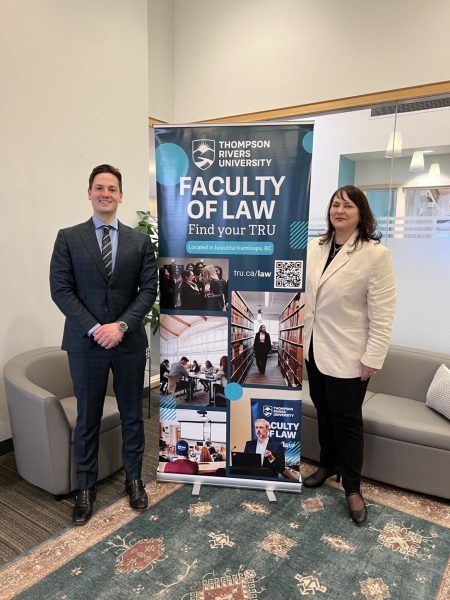Fraser MacLean, a TRU graduate (JD ’18) and associate at MacLean Law, has received a judgment in favour of his client on a landmark ruling pertaining to costs and the abuse of artificial intelligence (AI).
In Zhang v Chen (2024 BCSC 285), the parties were at loggerheads over parenting time of the couple’s three children. The respondent lives in China while the claimant resides in North Vancouver.
The judgment in question was on costs — specifically, special costs against the respondent’s counsel on the basis that the respondent’s counsel inserted into the notice of application two non-existent cases generated by ChatGPT. The non-existent cases generated by ChatGPT, M.M. v A.M., 2019 BCSC 2060 and B.S. v. S.S., 2017 BCSA 2162, somewhat convincingly cited precedents of internationally located parents who successfully obtained parenting time with their children. After spending hours researching these cases, MacLean’s office notified the respondent’s counsel that the cases could not be located and requested copies of them.

Fraser MacLean poses with TRU Law Dean Daleen Millard.
At the scheduled hearing, counsels for the claimant attended chambers and a different lawyer appeared for the applicant as the respondent’s counsel was unavailable. The respondent’s counsel sent an email to the applicant’s lawyer, in which she admitted that the two cases were generated by ChatGPT. Justice David M. Masuhara later heard the case and a ruling was provided on parenting.
The matter pertaining to whether the respondent’s counsel should be personally responsible for the costs, was adjudicated separately. In the ruling on costs, Masuhara introduced the issue by stating that the awarding of costs is discretionary. In the present matter, the claimant was substantially successful and was, therefore, awarded the costs.
On whether the respondent’s counsel should be personally responsible to pay the costs, Masuhara said to award special costs against a lawyer was an extraordinary step that required a finding of reprehensible conduct or an abuse of process by the lawyer. The court quoted R.16-1(3) which stipulates as follows:
(30) If the court considers that a party’s lawyer has caused costs to be incurred without reasonable cause, or has caused costs to be wasted through delay, neglect or some other fault, the court may do any one or more of the following:
a) disallow any fees and disbursements between the lawyer and the lawyer’s client or, if those fees or disbursements have been paid, order that the lawyer repay some or all of them to the client;
b) order that the lawyer indemnify his or her client for all or part of any costs that the client has been ordered to pay to another party;
c) order that the lawyer be personally liable for all or part of any costs that his or her client has been ordered to pay to another party;
d) make any other order that the court considers will further the object of these supreme court family rules.
A serious mistake
The court found that the respondent’s counsel’s insertion of fake cases led to additional effort and expenses which was, on her admission, a serious mistake. The court ruled that she was personally responsible for these expenses and that the registrar was to review these in accordance with the rules.
What is perhaps more important is that the court further ruled that the respondent’s counsel needed to review all her files before the court, and if any case or materials were found to be obtained from ChatGPT or other generative AI tools, she was ordered to advise the opposing counsels/parties and the court immediately. She was also ordered to provide the court with a report confirming a review of the files within 30 days of the judgment.
Masuhara added that, in the future, the respondent’s counsel was to advise the court and opposing parties when any materials she submitted to the court included content generated by ChatGPT or any other AI tools. In the final instance, Masuhara said, “Generative AI is still no substitute for the professional expertise that the justice system requires of lawyers.”
MacLean said, “What’s scary is these AI hallucinations aren’t generating ambiguous case summaries. These fake authorities were exactly on point and looked 100 per cent real in the summaries that were generated. It is important for both counsel and judges to be vigilant when checking for these things. It was a well-reasoned and balanced decision that gives sage guidance to the profession and the public on the issue of artificial intelligence in the legal profession.”
MacLean and another associate at MacLean Law, Jesse Emmond, visited TRU Law to teach a class in family law. MacLean said, “Our firm has been extremely impressed with the quality of law students that TRU Law produces, and we have had the pleasure of hiring and developing many successful graduates. My experience at TRU Law was first class, and I am forever grateful for the experience, education and training I received.”

